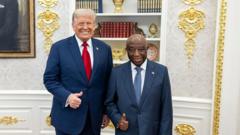US President Donald Trump has garnered attention for praising Liberian President Joseph Boakai for his "good English" and inquiring about his educational background. This commendation may underline a broader misunderstanding regarding Liberia's deep-rooted historical and cultural ties to the United States, from its colonial foundations to modern-day influences. Here are six essential points to help comprehend Liberia's significance:
1. **Foundation by Freed Slaves**: Established in 1822 by freed African-American slaves, Liberia declared independence in 1847. Many liberated Africans settled there during the transatlantic slave trade era, resulting in a culture heavily influenced by American heritage. This history led to a notable Americo-Liberian elite, which created friction with indigenous populations, reflecting a complex socio-political interplay that has lasted over a century.
2. **Capital Named After a US President**: The capital of Liberia, Monrovia, honors James Monroe, the fifth President of the United States and a proponent of the American Colonization Society. The city's architecture and prominent streets are replete with names of noted American figures, showcasing the continuous American influence.
3. **Flags of Similar Design**: Liberian and American flags share a remarkable resemblance, with 11 alternating stripes and a blue square containing a single star symbolizing Liberia's status as the first independent African republic, a nod to their shared heritage.
4. **Athletic Ties**: Timothy Weah, the son of former President George Weah, exemplifies Liberia's connections with the US through sport. As a US national football player currently with Juventus, he embodies the legacy of Liberia's diverse identities and international links.
5. **Nobel Peace Prize Laureate**: Ellen Johnson Sirleaf made history as Africa's first elected female president. Her tenure saw Liberia recover from civil strife, earning her a Nobel Peace Prize for her achievements in promoting peace and women's rights, accentuating Liberia's evolution into a respected democratic nation.
6. **Largest Rubber Plantation**: Home to the world’s largest rubber plantation operated by Firestone Liberia, the industry's historical and contemporary human rights concerns highlight the complexities of foreign investment in Liberia. With rubber as a significant export, the US continues to be Liberia's largest market despite accusations of labor rights abuses.
Liberians expressed mixed feelings about Trump's remarks, with government officials emphasizing a need for better global understanding of Africa's linguistic diversity. Local perspectives vary, with some asserting that Trump's comments reflected ignorance about Liberia's long-standing educational traditions and English proficiency. Yet others considered the compliment genuine, suggesting that misinterpretations might stem from preconceived notions about Africa.
These insights not only clarify the context of Trump's comments but also foster a broader understanding of Liberia's intricate history and cultural landscape.





















